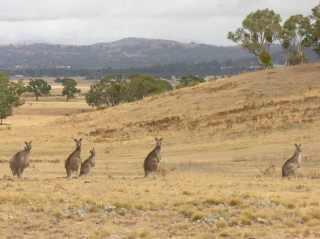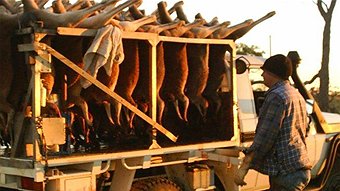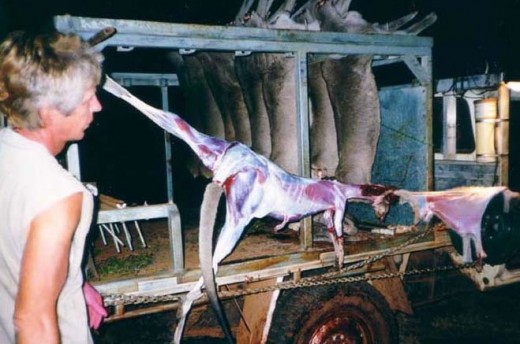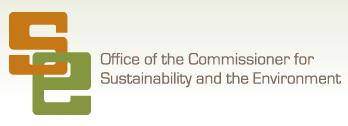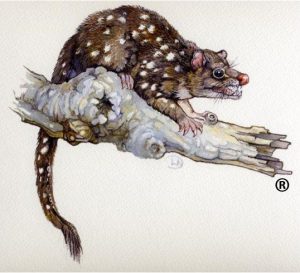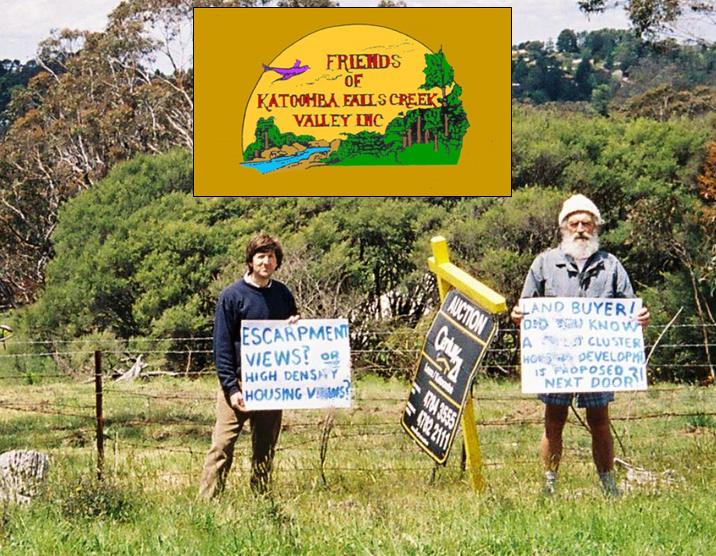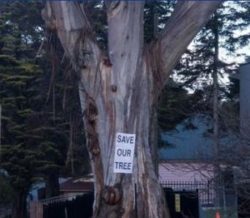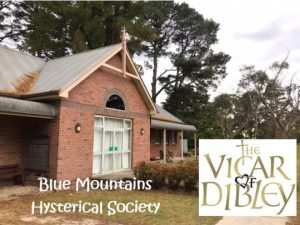ACT unqualified to condemn Kangaroos
Sunday, August 28th, 2011The following article was initially published by Tigerquoll on CanDoBetter.net 20090416 under the title: ‘ACT Environment Commissioner unqualified to condemn kangaroos’:
.
One day kangaroos grazing on Australian grasslands (long deforested by colonists)…
Next day, thanks to the ACT Commissioner for Sustainability and the Environment….
ACT Commissioner for Sustainability and the Environment, Dr Maxine Cooper, is the Australia Capital Territory’s inaugural full-time Commissioner in the role, yet what relevant environmental qualifications and experience does the incumbent have, or indeed lack, to be officially condemning another local indigenous population of Australia’s iconic marsupials, our kangaroos, to slaughter for pet food?

The Environment Commissioner’s own website lists her formal qualifications in the areas of:
- Environmental Planning
- Environmental Design
- Environmental Science
.
All these ‘environmentally’ friendly prefixes sound impressive, until one realises that each of these areas of academic study are not fauna focused, but indeed are all about human-centric utilisation of the natural environment for the benefit of humans. That is, these qualifications are all about maximising the convenience of the environment for humans. A wolf in charge of the kangaroos? It’s just like forestry pretending to care about forests.
Such qualifications offer no insight into the survival and habitat needs of Australian wildlife. “According to ACT’s inaugural Environment Commissioner, kangaroos at Belconnen were a threat to certain vulnerable and endangered species of fauna and flora on the site. Where’s the bloody independent zoological evidence, who would attest to this view under the test of peer scrutiny?
Now if our roo-shooting redneck commissioner had a more relevant Bachelor of Science in Zoology from say the University of Melbourne, she may be of a contrary mindset and less aligned to human planning needs and monetary gains; instead more empathetic to ecological needs of native fauna. The introductory paragraph for the University of Melbourne’s Honours degree in Zoology instills the following focus:
.
“How animals live and why they live that way are questions addressed by zoologists. Most of the Australian fauna are poorly understood or not even formally named, yet informed management and resource use of Australia’s flora, fauna and habitats depend upon zoological knowledge. We need to catalogue what species exist and how they survive in their natural environments. This requires knowledge of their physiology, breeding and reproductive systems, ecology, evolution and behaviour.”
[SOURCE: http://www.unimelb.edu.au/HB/areas/SZOOL.html]
Maxine Cooper, where are your qualifications in Zoology, in Conservation and in Australian wildlife to entitle you to officially condemn thousands of Australia’s iconic kangaroos to slaughter for cat and dog food?
Can you guarantee the Australian public that none of these kangaroos is to be minced for cat and dog food?
The standard setting for the job prerequisites for the ACT’s Environment Commissioner are woeful and clearly not in the best interests of the target subject – our natural wildlife. What were they thinking by employing a planner in environmental management?
.
.
.
Editor’s comment:
.
The stated role of the OCSE is to:
.
- ‘Investigate complaints about the management of the environment by the Territory or a Territory authority’
- ‘Conducts investigations as directed by the Minister’
- ‘Initiates investigations into actions of an agency where those actions would have a substantial impact on the environment of the ACT’
- ‘Produces state of the environment reports for the ACT and the 17 councils in the Australian Capital Region’
- ‘Makes recommendations for consideration by government and includes in our annual report the outcomes of those recommendations’
- ‘Resolves issues through mediation and conflict resolution’
- ‘Undertakes an advocacy and awareness role on sustainability and environmental issues.’
.
[Source: OCSE website, ^http://www.envcomm.act.gov.au/our_office]
.
So it basically seems to be an ACT Government environmental watchdog agency. Why?
The ACT covers only 2400 square kilometres and has under 400,000 people. It already has an Environment and Sustainable Development Directorate [Read More], which lumps disparate functions under one watered down super-ministry including environment, water, climate change, planning (including development assessment, leasing, construction, land use and utilities regulation, surveying and land information), the Government architect, heritage, transport planning and nature conservation.
So is OCSE the watchdog for one overburdened super-ministry? It is bureacracy gone mad. Since Canberra is the seat of the federal government and ACT is so small, why not just have the Federal Government look after ACT conservation matters and be cost effective with taxpapers’ money?
.
It is gross deceptive greenwash when the Australian Capital Territory government merges all its conservation responsibility into one super agency, The Office of the Commissioner for Sustainability and the Environment, (OCSE), then heads it up with a town planner [Read More], then tries to claims that it has custodial responsibility for environment and conservation on behalf of the people of the ACT. It is wholly consistent with government’s misuse and abuse of the word ‘sustainability‘ ~ to mean any action that sustains the government’s conveniences and political ends, such as land use development of grasslands for industry. The Office is simply a development planning arm of the ACT Government and many Canberra-based property developers are very happy with the arrangement thank you very much.
But it is the biased leading the inept when one reads a report, ‘Report of the Grassland Forum‘ dated 20 May 2010 on the website of this Office of the Commissioner for Sustainability and the Environment.
The report considers the future potential of the 10,000 hectares of native grassland just outside Canberra.
This report was not compiled not internally (probably because the OCSE employs not competent environmental scientists to do so), but believe it or not by a property development consulting firm ‘Beaconhill Consulting‘. ‘Beaconhill Consulting’s recent work is listed on its website as:
- Strategic performance review of a major multi-program investment portfolio valued at several hundred million dollars
- Due diligence examination of a multi-million dollar import business investment – supply chain and market analyses, review of product efficacy and policy framework
- Strategic Business Development for an emerging export business – Board level reforms and strategies, business plan development, commercialisation strategy, marketing plans, industry development application, governance arrangements and commercial partner negotiations
- Business Development, government submissions, marketing plans, and client tenders.
.
The ‘Report of the Grassland Forum’ “found that the Eastern Grey Kangaroos are the dominant herbivore in natural grasslands..and that their overgrazing has lead to erosion and loss of plant species“.
It is not surprising that the Maxine Coopper’s office has approved many hundreds of these native kangaroos have been conveniently slaughtered for pet food. Some nutter has even contrived a myth that these grazing native kangaroos are threatening the survival of a rare native Earless Dragon in the area. Kangaroos threatening native animals! That’ a cracker! The fact that thousands of hectares of these grasslands are planned for bulldozing to make way for industrial and residential development may not threatend the Earless Dragon is not mentioned in the report.
It is laughable to read terms such as ‘diversity‘ and ‘ecology‘ used in the report in the context of industrial development.
The study focused upon Canberra restricted supply and diversity of industrial land. It is considered that Eastern Broadacre will play a critical role in meeting Canberra’s industrial needs in the long term. The study found that possible uses include:
- Freight/ transport and logistics
- Industrial and associated office
- Warehousing/ storage
- Education and training facilities
- Tourism/ recreational uses
‘Belinda explained that the sustainability corridors may have broader considerations, and ACTPLA is keen to explore light industry ecology.’
.
[Read Report]So this is where the tax revenue of the people of Australia’s Capital Territory around Canberra is being spent. How much did this report cost? How much did the OCSE logo above cost – took a lot of imagination that one!
